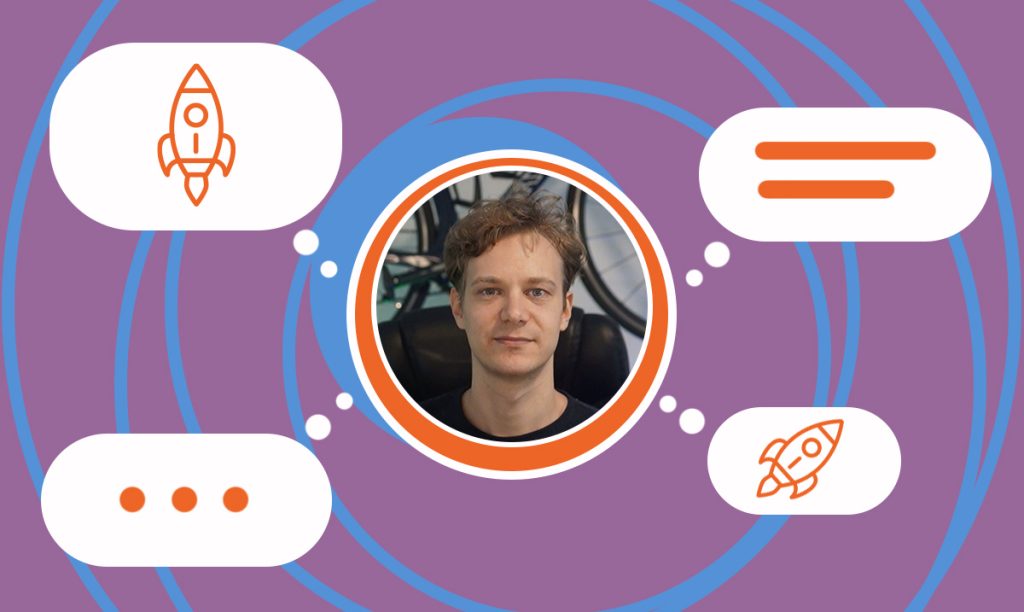In the ever-evolving landscape of laws, rules, and regulations affecting small businesses, it can be difficult for entrepreneurs to stay focused ont ...
How FounderBlocks Assists Startups in Achieving Success
Written by: Esther Strauss
Esther is a business strategist with over 20 years of experience as an entrepreneur, executive, educator, and management advisor.
Published on August 2, 2024

In this insightful interview, we speak with Lasse Schuirmann, the founder and CEO of FounderBlocks, an innovative accelerator program dedicated to empowering startups through execution workshops, customer validation, and scalable marketing strategies.
Lasse shares his journey of creating FounderBlocks, the unique revenue-sharing model, and the significant impact of no-code MVPs on the startup ecosystem.
Join us as we delve into his vision for the future of startups and the essential support FounderBlocks provides to entrepreneurs navigating the complexities of launching and scaling their businesses.
Inspiration Behind FounderBlocks
SBS – What inspired you to create FounderBlocks?
Lasse – Our startups!
With FounderBlocks, there never was that “perfect idea of how it will be in 20 years.” In our experience, startups, more often than not, don’t have that — if they are successful.
Instead, I created a software agency back then because some people needed my help with something. Over the years, we have worked more and more with big innovation departments and startups and noticed that they regularly fail on the same challenges.
Over time, we’ve built our “Founder Blocks,” which are ready-to-use services or mentoring programs that help our founders to reliably overcome specific challenges without having any risk of failing these.
Differentiation from Traditional Accelerators
SBS – How does FounderBlocks differentiate itself from traditional accelerator programs?
Lasse – We are a lot more hands-on.
Most accelerator programs provide network- and domain-specific advice. They are great for people who know how to start companies but want to strengthen their ties to their specific domain.
FounderBlocks is the reverse: We know how to build companies, but we leave the domain-specific part to the founder. We are able to engineer business models to success because we know the ins and outs of every type of business model (e.g., two-sided marketplaces), and we pair best with people who are experts in their domain.
One example is development. Domain experts are often nontechnical, and it’s hard to reliably get their first product off the ground. In those cases, we have a team that develops their software for them because we know they regularly fail this task otherwise or spend a huge amount of their runway here. That’s why we build the initial product for them.
At the same time, we set everything up so they can take over the product with their own team whenever they have grown enough to actually sustain that.
Overcoming Challenges in Execution Workshops
SBS – What are the biggest challenges startups face during the execution workshop, and how do you help them overcome these?
Lasse – The first thing we usually do with startups is the execution workshop.
We are founders. We are visionaries. That makes it easy to get lost in big dreams, and unfortunately, if we’re honest, we are also very good at building our own dream world that can become detached from reality.
This leads to a lot of work and investments that never pay off, which we’ve seen again and again.
When we start working with someone, we make sure they have one clear vision, target group, problem, and a clear process that solves that problem— rather than just building a collection of features.
Here’s an example:
A while ago, we worked with a startup that already had a valuation of 12m at that time. We basically forced them into this workshop (which they obviously didn’t want to do because, hey, they got that valuation, so they must have the basics covered, right?) and clarified their vision and their business model.
As a result, they immediately stopped two projects, freeing up 2.5 full-time people (employees and founders), as well as significant financial resources, because it was clear that the payoff would never come.
When people start, you obviously don’t have that direct before/after comparison because we prevent that problem from occurring before it happens: The startups gain a clear strategy and usually reduce the scope of planned things by around 80% (yes, that’s 80% less work/investment, usually a direct 20k+€ impact in one day), while at the same time making their business model and product more attractive than before.
Adapting Initial Product Ideas
SBS – How do you handle situations where a startup’s initial product idea needs significant changes during development?
Lasse – Let’s be frank: There is no startup where this is NOT the case. The first set of changes is happening based on data and logic in the execution workshop.
Generally, we rarely provide our own opinions to our startups. If we do, we clearly mark them as such. Our opinions don’t matter (unless we are the target group ourselves). Our experience with similar models can matter, and our ability to reason logically on data matters even more, so whenever we work with startups, we help them to logically deduce their next step so that this can be done unquestionably and without having to rely on opinions.
One of the first quotes we show startups when they work with us is, “The job of a founder is to transform an idea into a business model that works on the market.”
Transformation implies change. If we don’t change our ideas, we will likely have done something completely wrong.
Now, how do you convince someone to change their idea if you “know it better”?
There are several cases here:
- Most common — We have data from dozens of other startups, showing that an aspect of their execution is simply not a smart thing to do.
In this case, we simply show the founder the data. We are vetting out irrational founders who aren’t willing to build on data in the beginning, so the acceptance rate is very high here. - We help the founder gather data.
If we “have a bad feeling about something,” that can be useful to follow. However, it’s not sufficient to make a decision. So, if we are unsure whether something is a good idea and no clear data/indication exists, we point that out to them and help them gather data so they can make a decision.
Gathering the data usually helps direct the idea in a different direction. I only remember one case where the data pointed in a direction that wasn’t in line with the founder’s vision, and they ended up shutting down the project. In that case, gathering that data for about one week saved them an approximate investment of 150k€ that would have never worked out.
Validating Customer Waitlists Effectively
SBS – How do you ensure the validity and effectiveness of the customer waitlists you help startups build?
Lasse – In short:
- We make sure to test different problem perspectives in the ads that lead to the waitlist
- We put obstacles in front of the waitlist that people have to overcome in their minds (e.g., a pricing page or collecting more data)
By now, we can empirically tell that the waiting lists we build WILL convert into real customers later.
Criteria for Bootstrapping vs. Investor Funding
SBS – What criteria do you use to decide if a startup is suitable for bootstrapping or needs investor funding?
Lasse – It’s a question of scale and upfront investment.
Honestly, with our model, many business models become “bootstrapable” because we lower the investment threshold from multiple years with five people to 3–12 months with just the core team, sometimes working only part-time.
After validating the business model, the numbers we collect can give a good indication of whether to bootstrap or not. However, the market, mindset, and business model mechanics play a role too.
Balancing Support and Startup Autonomy
SBS – How do you manage the balance between providing comprehensive support and allowing startups to maintain autonomy?
Lasse – We work at multiple levels with our startups, so they decide what’s best for them. They are the captains of their ships.
The most basic level is where founders do everything on their own, and we provide a streamlined process for them. That involves giving them videos, a lot of templates (why should every startup create the same costly learnings about what landing page converts best on their own bill?), and regular sparring. In short, we help them shortcut all the learnings we had with all our previous startups.
Many founders decide beyond that, so it simply makes sense to have a team that is used to building MVPs for startups with our specific process. We then take over the product for them as well. The same goes for the validation.
These are our “blocks” where startups can choose what’s best for them.
Common Pitfalls for Startups
SBS – What are some common pitfalls you see startups encounter, and how do you help them avoid these?
Lasse – In order of appearance from the journey of a single startup:
Reality Distortion
In the beginning, most founders believe their idea is worth the world. They think about building a team, so they realize it.
Soon, however, they find out what the reality is:
- The idea is subject to change because their customers need something different
- This change alone is a lot of work — for them — because very few people buy in on just an idea
This goes hand in hand with…
Lack of Customer Focus
One of the biggest priorities needs to be to communicate and build a product from the customer’s viewpoint.
The harsh truth is that a customer doesn’t care who you are or what you do. They care about how you change their lives.
So, stop telling your customers how specifically you are “helping them” or what you had to invest or endure to get where you’re at.
Tell them which of their pains you can solve — and shut up to listen to their worries and pains instead of being that talking head nobody listens to.
Lack of Focus
Once founders get active, they pursue tons of “opportunities.” Pursuing many opportunities is usually as good as pursuing none.
Figuring out what to focus on and what activities or investments to drop is one of the major tasks at the beginning of a founder’s career. That simply doesn’t get done in a lot of cases at all!
Ensuring Continuous Growth and Scalability
SBS – How do you ensure continuous growth and scalability for startups beyond their initial launch?
Lasse – We use data to achieve product market fit. Right from the get-go, all our MVPs are instrumented with tracking for maximum learning.
After launch, we need to:
- Understand where we are losing users within the app
- Understand how we can distribute the app more scalably
To do that, we collect data and act on it instead of simply building an empty vision of a person. This way, we can engineer success.
Advice for Entrepreneurs Considering Accelerators
SBS – What advice would you give to entrepreneurs considering joining an accelerator program like FounderBlocks?
Lasse – There’s no point when it’s “too early” for your startup to start talking with other people — like us. In fact, the earlier you talk with us, the more shortcuts we can give you and the more work we can save you.
What matters, and is a prerequisite, is that you’re fully committed and you know that you are going to pursue your business model.
Future of the Startup Ecosystem
SBS – How do you see the startup ecosystem evolving in the next five years, and how is FounderBlocks preparing for these changes?
Lasse – I don’t have that glassball. But we won’t stop until we have the best. possible. solution. for our customers.
We won’t stop getting better.
Our current net promoter score is at 9.2, so almost all our customers rate us 10 out of 10. This only tells us that we need to get to 9.5.
In the past months, we’ve been reworking all our blocks to make founders measurably more successful, adding insane guarantees that nobody else on the market dares add (to our knowledge), and we’ll keep building a better solution than we had in the previous month — every single month.
Subscribe to Our Newsletter
and gain insider access to cutting-edge business insights and trends.
Featured Resources

Legal Compliance Tips for Startups: Contracts and Clauses
Published on July 22, 2024
Read Now

Insights on Global Expansion for Startups
Published on June 12, 2024
Embarking on the journey of global expansion can be both exhilarating and daunting for startups. As they navigate unfamiliar territories,entrepreneu ...
Read Now

Techniques for Effective Leadership in Startups
Published on June 12, 2024
To shed light on the nuanced strategies that drive startup triumphs, we’ve tapped into the wisdom of seasoned entrepreneurs and industrytrailb ...
Read Now

Legal Challenges for Startups and How to Navigate Them
Published on June 12, 2024
We’re about to venture into the somewhat choppy waters of legal challenges for startups. But don’t fret — we’ve got a survivalgu ...
Read Now

Navigating the No-Code Era: Jesus Vargas on Empowering Startups
Published on November 28, 2023
The rise of low-code/no-code platforms is revolutionizing the way entrepreneurs and businesses approach software development. In this enlighteningin ...
Read Now

15 Best Software Business Ideas for Startups & SMEs
Published on June 16, 2022
The global software industry is worth a massive $600 billion and projected to expand nearly a third by 2027. For software developers and engineers,t ...
Read Now
Comments